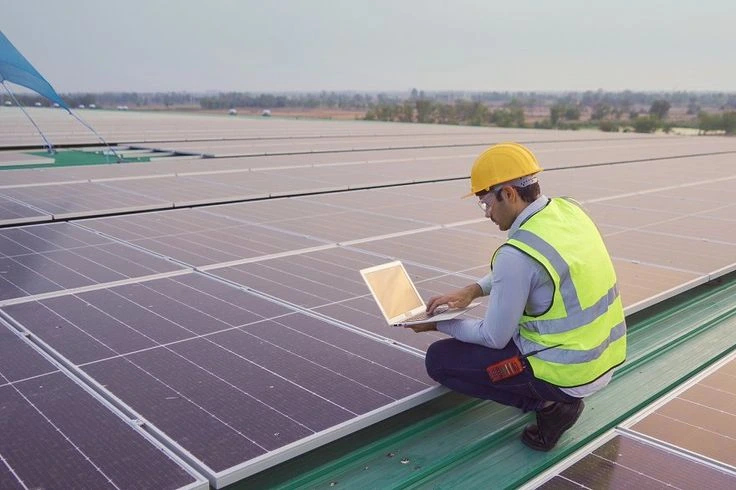If you’re considering sustainable development, installing solar panels for your factory offers a reliable path forward. Utilizing solar panels means managing costs, respecting the environment, and attracting investors.
As energy costs continue to rise and fossil fuel reserves dwindle, factories increasingly need sustainable and economical solutions for energy supply. Among these, solar energy stands out as one of the most accessible and cost-effective renewable resources. Using solar panels in factories not only reduces dependency on non-renewable sources, but also enhances energy security and protects against electricity and fuel price fluctuations.
In many developed countries, factories have successfully reduced operational costs by investing in solar systems and even selling excess electricity back to the grid.
The Role of Solar Energy in the Installation and Operation of Solar Systems for Factories
Given that the industrial sector is one of the largest consumers of electricity, power costs have a direct impact on factory profitability. Solar panels can significantly reduce these expenses—sometimes by more than 50% in sunny regions. But cost savings are only part of the benefits. Environmental concerns and legal limitations on emissions have pushed factories toward carbon reduction. Installing solar systems can drastically cut CO₂ emissions and help meet international environmental standards. This not only reduces penalties but also improves brand image in the eyes of customers, investors, and regulatory bodies.
To maximize the benefits of solar panels, careful planning is essential before installation. Factors such as sunlight intensity, usable space, energy consumption, and factory equipment all influence optimal system design and implementation. This article provides a comprehensive and practical overview of all stages of solar system installation, operation, and optimization—from basic principles to benefits, challenges, technical requirements, and real-world success stories. Join us to see how solar energy can transform the industry and pave the way to a greener and more sustainable future.

Types of Industrial Solar Panel Systems for Factories
Photovoltaic (PV) systems form the foundation of solar electricity generation. In this technology, solar panels convert sunlight into electricity by exciting electrons in semiconductor materials. The electricity generated is initially direct current (DC) and is then converted to alternating current (AC) by inverters—ready for use in industrial equipment.
Types of Solar Systems in Industries and Factories:
- On-Grid Systems:
Connected to the national grid. Excess energy can be sold back to the utility. Ideal for factories in sunny areas that use grid power at night. - Off-Grid Systems:
Designed for remote factories without access to the grid. These systems provide full energy independence. - Hybrid Systems:
Combine both previous types. They can store energy and remain connected to the grid—perfect for high-reliability energy needs during off-hours or emergencies.
Main Components of an Industrial Solar System:
- Solar Panels: The heart of the system, responsible for capturing sunlight and generating electricity.
- Inverters: Convert DC to AC power for industrial use.
- Batteries: Store electricity for nighttime or peak demand (in off-grid or hybrid systems).
- Monitoring Systems: Track performance, energy production, and detect faults in real-time.

Why Solar Panels Are a Smart Choice for Factories
- Significant Reduction in Electricity Costs:
Imagine an auto parts factory paying 100 million Tomans monthly for electricity. With solar panels, this could be halved—saving hundreds of millions yearly and directly increasing operational profit. - Environmental Impact and Green Branding:
For instance, a food packaging factory that installs solar panels can drastically reduce greenhouse gas emissions. This reduces environmental costs and boosts brand image among conscious customers and investors. Brands like Daimler and X-Mart have built their green identity through renewable energy. - Energy Independence and Lower Risk:
A factory in a desert region with limited grid access can use solar systems to supply most of its power—achieving energy independence and reducing risks of fuel price volatility and blackouts. - Attracting Forward-Thinking Clients and Investors:
Companies like Apple and Google have not only cut operational costs with solar power but also attracted more investors by building responsible brands. For factories aiming for sustainable growth, solar energy is a strategic advantage.

Technical Review of Solar Panels for Factories
- Choosing the Right Panel Type:
Monocrystalline and polycrystalline panels are the most common for factories. Monocrystalline panels offer higher efficiency and are ideal for limited spaces like rooftops. Polycrystalline panels are more cost-effective and suitable for large industrial areas. For example, in a textile factory with limited sunlight, monocrystalline panels would perform better. - Engineering Design of the System:
Proper design requires thorough analysis of daily electricity consumption, regional sunlight levels, and factory operations. In a pharmaceutical factory requiring constant power, the system must ensure zero outages or voltage drops—hybrid systems (solar + storage) are ideal here. - Calculating Capacity and Number of Panels:
Suppose a factory needs 100 kWh per day and is located in an area with 5 kWh/m² solar irradiation. Around 20 m² of efficient solar panels would be needed to meet this demand. However, efficiency, installation angle, and sunlight hours all affect the calculation.

Evaluating Solar Potential for Factories
Before installing solar panels, a thorough site assessment is crucial. This includes solar irradiation levels, usable space, and the factory’s actual energy needs.
- Sunlight Exposure and Panel Efficiency:
Solar radiation is a key factor in solar panel efficiency. Areas like southern Iran with high sunlight are ideal for installation. Analyzing seasonal sunlight patterns and matching them with factory energy demand supports optimal design. - Installation Space Evaluation:
Flat rooftops, surrounding land, or even parking lots may be suitable. Identifying obstacles such as shading is essential for efficient space use. - Energy Needs and System Capacity:
Estimating annual electricity consumption helps define the appropriate system size. Some factories meet all their energy needs with solar, while others only a portion. Accurate estimates help select the right solar setup. - Compliance with Technical Standards:
Adherence to safety, design, and grid connection standards is necessary for legal and safe operation. These standards vary by industry and location.

Key Considerations Before Installing Solar Panels in Factories
At this stage, structural and technical compatibility of the factory must be assessed for a successful project execution.
- Structural Compatibility:
The factory roof or ground must support the panel weight. Otherwise, structural reinforcement or new infrastructure may be needed. - Grid Connection Requirements:
Assessing the factory’s electrical system and its compatibility with solar panels is vital. In hybrid systems, grid integration is even more critical. - Regulatory Compliance:
Following national regulations, such as those from Iran’s Renewable Energy Organization, helps optimize system performance and avoid legal issues.

Case Studies of Successful Solar Panel Installations in Factories
Toyota Factory in Japan:
Toyota has invested heavily in renewable energy. In one Japanese facility, solar panels supply over 15% of the factory’s power needs—cutting greenhouse gas emissions and removing around 50,000 tons of CO₂.
Ford Factories in the U.S.:
Ford Motor Company has implemented solar systems across its U.S. plants. In one project, it generated 2 million kWh annually—saving over $500,000 and enhancing its brand as an environmentally responsible manufacturer.
Steel Factories in Iran:
Some heavy industries in Iran, such as steel production, have begun using solar energy. For example, a steel plant in Isfahan installed a 500 kW rooftop system, saving around $100,000 annually while reducing environmental impacts.
Cement Factory in Fars Province:
This cement factory installed a large-scale solar system to meet part of its energy demand. The project not only reduced energy costs but also lowered emissions—saving about $150,000 annually.

The Future of Your Factory Is Under the Sun
In today’s world, factories seeking to cut energy costs, boost efficiency, and protect the environment can no longer ignore the advantages of solar energy. Installing solar panels is not just a smart economic investment—it’s a powerful step toward sustainability and energy independence.
With modern technology and the success stories of hundreds of factories in Iran and abroad, now is the time to seize the opportunity. Whether you aim to reduce dependence on the grid or build a green and responsible brand, solar energy is the perfect choice for forward-thinking industries.
A decision today means decades of savings tomorrow. Take the first step now. Solar panels are ready to bring a big change to your factory.
Introducing Shamim Andisheh — Your Partner in Solar Energy Projects
If you’re planning to install solar panels for your factory and looking for an experienced professional partner, Shamim Andisheh is ready to assist you. With expertise in designing, supplying, and installing industrial solar systems, our team can guide you through every stage—from initial consultation to installation and post-project support.
Contact us for more information, consultation, or to purchase solar panels:
- ☎️ Phone: 021-44071011-12
- 📧 Email: shamim@shamimco.com
- 🌐 Website: www.shamimco.com
- 📱 Social Media: Reach us via 09394121002

 English
English العربية
العربية

















